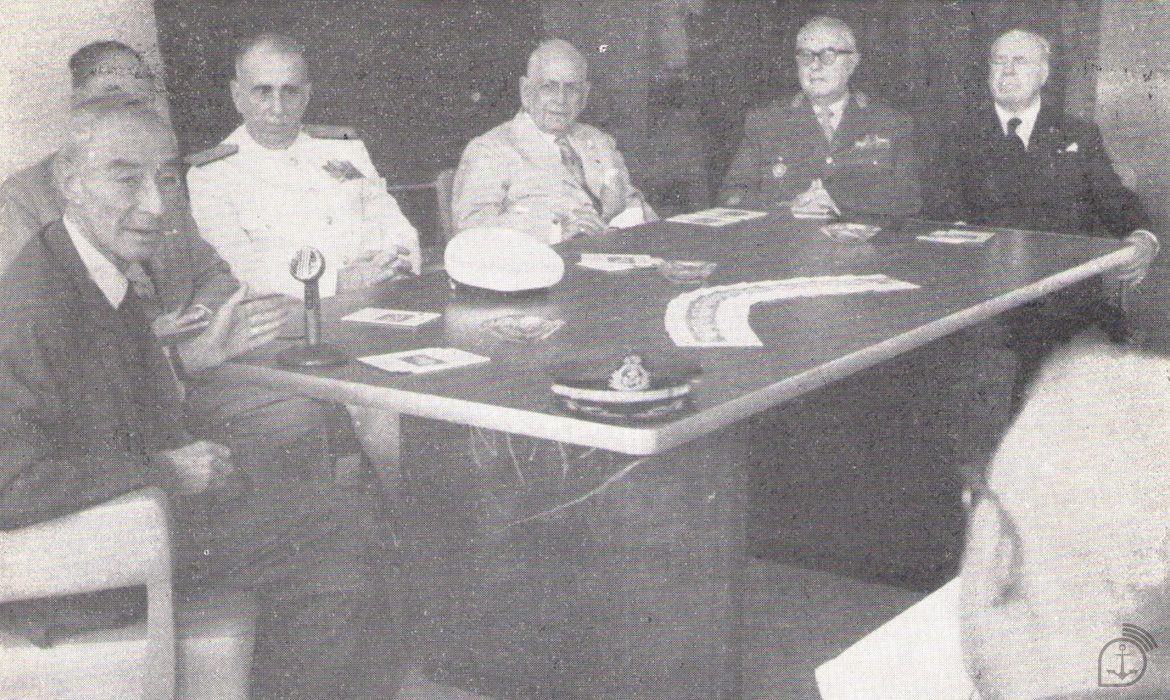This was one of the points defended by the American physicist Oppenheimer, during a historic visit to the Navy Research Institute, in Rio de Janeiro, in 1961.
By First Lieutenant (RM2-T) Luciana Almeida – Brasília, DF
In the month that the movie “Oppenheimer” premiered in Brazil, the Brazilian Navy (MB, in Portuguese) shares the historical records of U.S. scientist J. Robert Oppenheimer’s visit to the Navy Research Institute (IPqM, in Portuguese), on September 20, 1961. He was an important physicist who worked on the development of one of the world’s first nuclear weapons in the 40s.
During the visit, Professor Oppenheimer visited the Institute’s building, under construction at the time, for the installation of laboratories and construction of the second block, when he emphasized that science and technology are “from the military point of view, the greatest weapon of a nation, its greatest power. That is why it is up to the Navy to employ part of its resources in this sector. From the civilian point of view, the by-products of the Navy’s scientific and technological activities – specialized personnel, technologies, scientific knowledge, processes, materials, education, etc. – are other fruitful factors of national progress due to the benefits they bring to industry, commerce, universities, the community in general”.
He also stated that the Brazil of the future would be based on the technical and scientific preparation of its personnel and on the “technological quality of national industry, the stability of the domestic economy, the progress of its laboratories, institutes and universities, the seriousness of its pure and applied research”. He also praised the Navy’s investment in the IPqM. “It seems to me that the step you have taken here, to immerse yourselves in the heart of the technological situation, has been very right. It will put you in touch with the industries of this country, with foreign industries; it will put you in touch with scientists and universities; and it will put you in touch with military problems and with their complementary civilian problems,” he said.
IPqME

On April 26, 1984, the National Institute of Sea Studies (INEM) was created, now the Admiral Paulo Moreira Institute of Sea Studies (IEAPM), which assumed responsibility for conducting the work related to marine biology (Cabo Frio Project), until then developed at IPqM. From that time on, IPqM began to prioritize efforts in projects related to material for military use, with the possibility of dual use.
Currently, subordinated to the General Directorate of Nuclear and Technological Development of the Navy (DGDNTM) and the Navy Technological Center in Rio de Janeiro (CTMRJ), IPqM works in partnership with universities, companies and civilian and military research centers, in scientific research and technological development activities in the areas of: Armament, Electronic Warfare, Underwater Acoustics, Control and Monitoring, Materials and Inertial Navigation.
With the motto “Our goal is to develop technologies needed by the Navy”, IPqM continues to develop defense material and also contributes to the scientific, technological and economic development of Brazil.
Certainly, Oppenheimer’s words served as an incentive to the High Naval Administration regarding investments in Science and Technology, which today prove to be fruitful. Currently, the Brazilian Navy leads several projects that involve the development and intensive use of scientific knowledge, especially in its Strategic Programs, such as the Navy Nuclear Program, which includes sensitive technologies for the manufacture of the first conventionally armed nuclear-powered Brazilian submarine.
Navy Nuclear Program

The Navy Nuclear Program (PNM), which has been running since 1979, aims to master the nuclear fuel cycle and develop and build a nuclear power generation plant. It currently has two projects, which are the Nuclear Fuel Cycle and the Nuclear-Electric Generation Laboratory.
The Nuclear Fuel Cycle aims to master the technology of nuclear fuel production; and the Laboratory of Nuclear-Electric Generation (LABGENE) aims to develop technological training in the design, construction, commissioning, operation and maintenance of nuclear reactors of the PWR (Pressurized Water Reactor) type. In it is developed the Prototype reactor for the first Conventionally Armed Submarine with Nuclear Propulsion.
Navy’s Submarine Program

The Navy’s Submarine Program (PROSUB) also represents a significant technological advance for the country, based on intellectual capital, sensitive engineering and cutting-edge technology. In addition to encouraging defense policy, it boosts personnel training and national sovereignty. It was created in 2008, through the partnership established between Brazil and France, with the aim of producing four conventional submarines and manufacturing the first Brazilian conventionally armed submarine with nuclear propulsion.
In addition to the submarines, PROSUB includes the construction of a complex of industrial infrastructure and support for the operation of submarines, which includes the Shipyards, the Naval Base and the Metal Structures Manufacturing Unit (UFEM), in Itaguaí (RJ).
For the Commander of the Navy, Admiral Marcos Sampaio Olsen, PROSUB has become one of the largest industrial and technological training programs ever observed by the Brazilian defense industry sector. “The nationalization planned for the submarines encompasses hundreds of projects aimed at transferring technology and know-how to train national companies. The indigenous development of this technology raises Brazil to a prominent position in the most important international defense forums, “explained Admiral Olsen.
Source: Agência Marinha de Notícias
